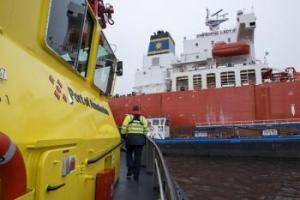Harbour Master
Harbour Masters
Worldwide there are approximately 3,000 merchant ports and the work of the Harbour Master can vary widely from country to country and from port to port even within the same country.

On 9 June Eng Abdulrab Al-Khulaqi, Deputy Executive Chairman of Yemen Gulf of Aden Ports Corporation (YGAPC), received at the Marine Department Building, Ms Marcela Masiarik, the chancellor of the German Embassy, and Ms Melissa Rahmouni, Senior Advisor at the French Embassy in Yemen.
Captain Ahmed Al-Bishi, Acting Director of General Maritime Operations, welcomed the visitors and explained the functions of this department, which works around the clock, the main interface of the port, through which the procedures for receiving ships, berthing and sailing are arranged.
For his part, Captain Hani Abdul Muti, Deputy Director of Maritime Operations for Traffic Affairs, pointed out that the Maritime Administration is on the verge of an unprecedented development in its work through the implementation of the Ships Control Services (VTMIS) project funded through the United Nations Development Programme (UNDP).
An extensive discussion took place (pictured here) with the visitors about ways to stimulate economic activity through the port of Aden, which is the main gateway to Yemeni maritime and commercial activity. Here they addressed the challenges that emerged after the war, which resulted in restrictions to commercial activity and the shift of part of it to neighbouring ports, especially Salalah. They also discussed the tremendous efforts made by the Resident Representative of the United Nations Development Programme, Mr Auke Lootsma, to implement the project of placing the financial deposit in the marine insurance market, which will reduce the war risk fees imposed on the port due to its classification as a war zone.
After the meeting the visitors left for port of Ma’alla to see the port’s cargo handling capacity and its facilities, such as grain silos, oil tanks and cement production, and to learn of the ongoing activity and the port’s assets’ damage.
The United Nations Development Programme, represented by Mr Kennedy Chibvongodze, had arranged for this visit, which was appreciated by the visitors who expressed their fascination with the size of the port, the natural protection it provides, and its great potential for expansion.
Founded in 2017, MarineLabs delivers high-resolution, real-time, and historical wind, wave, and weather data, as well as hyper-local 10-day forecasting, from a growing network of cloud-connected, rugged sensor nodes.
The International Harbour Masters Association (IHMA) and the Port of Rotterdam Authority are pleased to announce the 15th International Harbour Masters Association Congress, to be held from 09–12 June 2026 at Theater Zuidplein in Rotterdam.